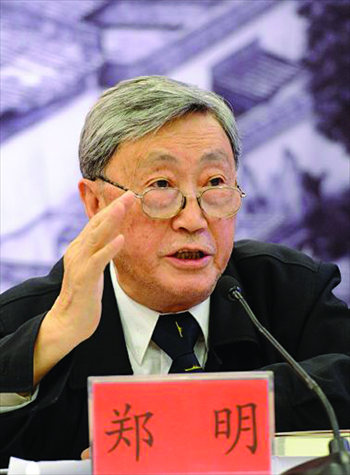South China Sea waters kept safe for all

Editor's Note:
The 45th ASEAN Foreign Ministers Meeting, held in Cambodia during July 9-13, is being clouded by the Philippines and Vietnam's intention to include the South China Sea issue as part of the meeting. How can China devise a better plan to safeguard its rights and interests? Huanqiu.com (HQ) talked to Zheng Ming (Zheng), a retired rear admiral of the PLA Navy, on these issues.
HQ: What issues does China face in maintaining its claims in the South China Sea?
Zheng: China faces serious challenges of reunification and security issues.
There are always people who spread unfounded rumors related to the South China Sea.
They demand freedom of navigation, but there is no limitation on that. Not only is Chinese vessels' safety of navigation can be guaranteed, but also vessels from other countries can cruise the ocean without hindrance.
The key to this problem lies in the disputes of sovereignty over the islands in the South China Sea.
Disputes have also been aroused because of abundant oil resources and other marine resources.
That is the reason why the Philippines didn't have questions or objections over China's claim in the last decade, but does now.
HQ: Some argue that China should use force to settle these disputes. As a veteran, why do you think China is showing restraint?
Zheng: I think people, governments and politicians should be treated differently.
The Philippines is a big country with more than 90 million people. China and the Philippines have had historically friendly exchanges. However, we have to realize that there are some politicians who are ambitious to fish for political capital by creating disturbances. They sow discord between both people and nations.
Our government believes that the mainstream of the Philippine government attaches great importance to the general situation of long-term development and friendship between Chinese and Filipinos.
Mainstream officials occupy leading positions in the Philippines government, and they will not be manipulated by those politicians with hostile intentions.
Our equipment has been greatly upgraded and China has become rather powerful. We have no intention of confrontation with others. China just wants to safeguard its own interests.
HQ: Under the current circumstances, how can China strategize a better plan to safeguard its rights and interests in the South China Sea?
Zheng: The Philippine media have been trying to put the Huangyan Island incident in the spotlight since it happened in April. However, the Chinese government has made great efforts in mitigating the tension through diplomatic talks. Generally speaking, the Chinese government has taken a proactive role.
Our ocean-related government branches such as the State Oceanic Administration and China Meteorological Administration have decided to include the weather forecast of Huangyan Island, Yongxing Island, and Yongshu Reef into the national weather forecast program.
It is intended to inform the public of information about public security, which will be beneficial to both the Chinese vessels and foreign vessels in the South China Sea.
This step not only demonstrates China's jurisdiction over the South China Sea, but also provides a service to the international community.
Some countries claim sovereignty only out of the search for energy and resources.
The Chinese Ministry of Agriculture and relevant fishery authority have prescribed a moratorium on fishing for part of the year, which is actually aimed at the conservation of ocean resources for the common interest of mankind. Those countries picking on this moratorium just ignored the interests of the whole international community.
Another case is the work done by our transportation authority, especially the specially organized search and rescue team.
The circumstances, hydrological situation, and weather in the South China Sea are very complex. So the transportation authority strengthened the search and rescue team, which can rescue any foreign vessels in danger.
Therefore, we can say that all the Chinese maritime authorities have performed a lot of duties in safeguarding this area, which also demonstrated Chinese jurisdiction over the South China Sea.
Some people are now complaining about the lack of a clearly defined strategy at the top level of the government. However, we must bear in mind the words of former Chinese leader Mao Zedong that the decisions made by the leaders should experience a process of arising from the people and working for the people.
Only when all the people have been mobilized and the whole of national proactivity, creativity, and knowledge have been accumulated, can we have a complete, correct, and scientific ocean development strategy.
People from different areas, ranging from ordinary people to specialists, and the leaders, should all consider what to do so as to foster a proper environment for the research and drafting of an ocean development strategy.
The current media focus is a good sign, which has invoked rather free expression of opinions from many experts.
Some opinions may not represent the stance of the government. But they have really conveyed some deep insights.